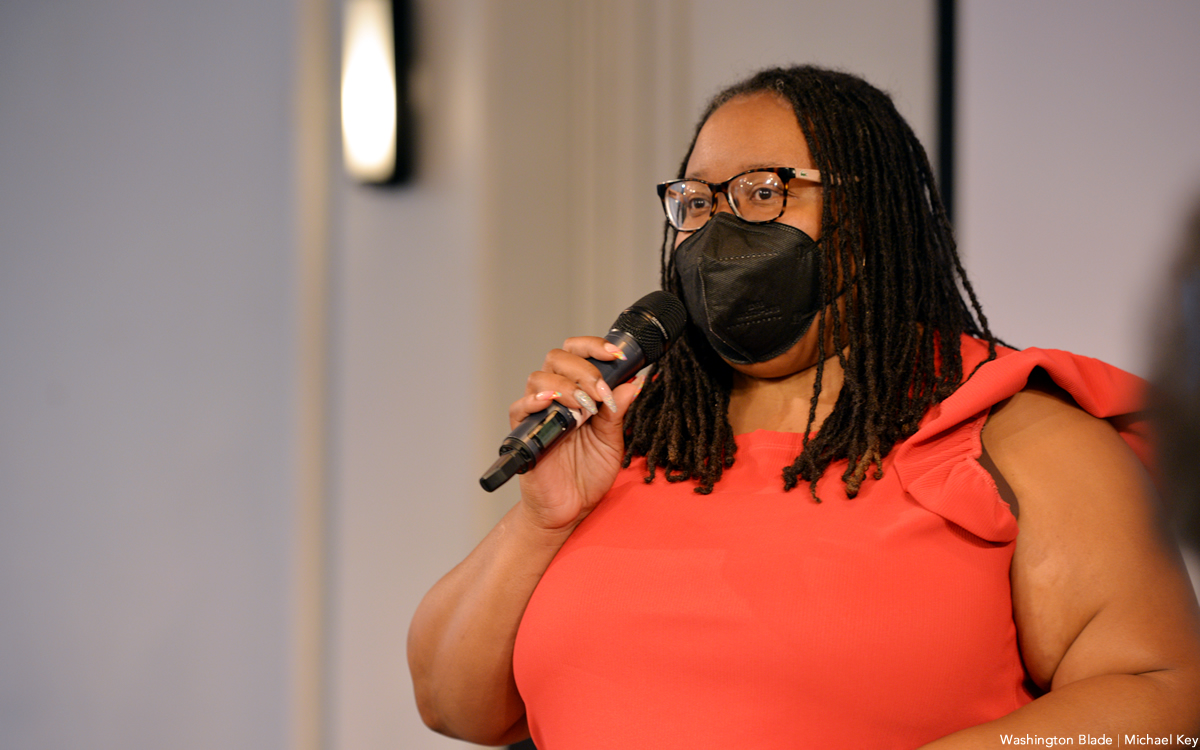District of Columbia
Newly diagnosed HIV cases increased slightly in D.C. in 2021
Report cautions fewer people were tested during COVID-19 pandemic

The D.C. Department of Health’s Annual Epidemiology and Surveillance Report released on Tuesday shows there were 230 newly diagnosed HIV cases in the D.C. in 2021, the most recent year in which data have been analyzed.
The report says the 230 cases in 2021 represents an 83 percent decline in new cases from the peak number of 1,374 cases in 2007, but a slight increase from 219 cases reported in 2020. The report shows there were 273 newly reported HIV cases in 2019, 331 cases in 2018 and 386 in 2017.
In addition to HIV, the report includes data related to the number of newly reported cases of hepatitis, tuberculosis, and other sexually transmitted infections such as syphilis, gonorrhea and chlamydia.
“Annual surveillance data is critical to our understanding of disease trends and our planning and programmatic efforts to control and prevent disease,” the report says. “However, the data in this year’s report must be examined in the context of the COVID-19 pandemic. The pandemic continues to have an immense impact on the availability, accessibility and utilization of disease screening, prevention, and care services,” according to the report.
Among other things, the report says the D.C. Department of Health, to which it refers as D.C. Health, saw a 20 percent decline in the volume of HIV, chlamydia, gonorrhea, syphilis and hepatitis laboratory reports received in 2020 compared to 2019, indicating fewer people were being tested and diagnosed for the diseases.
“HIV lab volume decreased further from 2020 to 2021 with a 20 percent decline, and an overall decline from 2019 to 32 percent,” the report says. “Given disruptions to screening services, the potential for underdiagnosis and underreporting is most substantial for those with asymptomatic infections,” it says.
The Annual Epidemiology and Surveillance Report was released at a Tuesday event at the city’s Town Hall Education Arts Recreation Campus in Southeast D.C. in commemoration of Black HIV/AIDS Awareness Day.
Among those who attended or spoke were Harold Phillips, director of the White House Office of National AIDS Policy, and Dr. Demetre Daskalakis, deputy coordinator of the White House Mpox Response who’s on leave from his role as director of HIV/AIDS Prevention at the U.S. Centers for Disease Control and Prevention.
Also participating in the event were Rita Harcrow-Flegel, drector of the U.S. Department Housing and Urban Development’s Office of HIV/AIDS Housing; Dr. Sharon Lewis, interim director of D.C. Health; Clover Barnes, senior deputy director of D.C. Health’s HIV/AIDS, STD, and TB Administration, and Erin Whelan, executive director of the D.C. LGBTQ youth advocacy group SMYAL.
Statements at the event by the White House and D.C. officials and a statement released by the office of D.C. Mayor Muriel Bowser point to stepped up efforts by D.C. to provide HIV testing and treatment services to all those at risk for HIV, including services free of charge for those unable to pay for them.
Among the services announced is the availability of Post Exposure Prophylaxis, or PEP, a medication D.C. Health is offering free of charge that is taken to prevent HIV infection if taken within 72 hours of being exposed to HIV. Also available, officials said, is the medication known as Pre-Exposure Prophylaxis, or PrEP, which, when taken as a daily pill, prevents people from becoming infected with HIV. That too is available free of charges for those in need, the statement from the mayor’s office says.
“We want people in D.C. to know their status and get connected to the right care at the right time — with no shame or stigma attached,” Bowser said in the statement. “We have so many fantastic healthcare partners in D.C., and they have helped us expand access to free PEP, free PrEP, free condoms, free at-home tests, and more,” the mayor said. “Now, we need to make sure people know what’s available and how to access it.”
The statement calls on the public, especially those at risk for HIV, to access information about the city’s HIV prevention and support related services through a new website: sexualbeing.org.
It says the city continues to push for its “bold goal” of having fewer than 21 new HIV diagnoses each year by 2030. It says the city is also stepping up efforts to ensure that everyone who tests positive for HIV will quickly access the anti-retroviral medication that, if used as directed, prevents HIV related illness and suppresses a person’s HIV viral load to a point where they cannot transmit HIV to another person through sexual contact.
The newly released report includes these findings for the year 2021:
• There were 11,904 current D.C. residents, or 1.8 percent of the population, living with HIV in 2021.
• Sexual contact was the leading mode of transmission of newly diagnosed HIV cases in 2021.
• There were 230 newly diagnosed HIV cases in 2021, a small increase over the 219 new cases reported in 2020, but a significant drop from the 1,373 cases in the peak year of 2007 and the continued decline in cases in subsequent years.
• The proportion of people living with HIV in D.C. in 2021 that are Black is 71 percent
• The proportion of Black men diagnosed with HIV in 2021 who have sex with men (MSM) was 35 percent.
• The proportion of white men diagnosed with HIV in 2021 who have sex with men (MSM} was 8 percent.
• The proportion of Black heterosexual men diagnosed with HIV in 2021 was 8 percent.
• The proportion of Black heterosexual women diagnosed with HIV in 2021 was 15 percent.
• The report does not show the proportion of white heterosexual men who tested positive for HIV in 2021.
• The proportion of transgender persons diagnosed with HIV in 2021 was 3.5 percent.
• In 2021, the overall gender breakdown in the proportion of newly diagnosed HIV cases was 73.9 percent male and 22.6 percent female.
The report was expected to be posted for access on the D.C. Health website at www.dchealth.dc.gov
District of Columbia
D.C. police arrest man for burglary at gay bar Spark Social House
Suspect ID’d from images captured by Spark Social House security cameras

D.C. police on Feb. 18 arrested a 63-year-old man “of no fixed address” for allegedly stealing cash from the registers at the gay bar Spark Social House after unlawfully entering the bar at 2009 14th St., N.W., around 12:04 a.m. after it had closed for business, according to a police incident report.
“Later that day officers canvassing for the suspect located him nearby,” a separate police statement says. “63-year-old Tony Jones of no fixed address was arrested and charged with Burglary II,” the statement says.
The police incident report states that the bar’s owner, Nick Tsusaki, told police investigators that the bar’s security cameras captured the image of a man who has frequently visited the bar and was believed to be homeless.
“Once inside, the defendant was observed via the establishment’s security cameras opening the cash register, removing U.S. currency, and placing the currency into the left front pocket of his jacket,” the report says.
Tsusaki told the Washington Blade that he and Spark’s employees have allowed Jones to enter the bar many times since it opened last year to use the bathroom in a gesture of compassion knowing he was homeless. Tsusaki said he is not aware of Jones ever having purchased anything during his visits.
According to Tsusaki, Spark closed for business at around 10:30 p.m. on the night of the incident at which time an employee did not properly lock the front entrance door. He said no employees or customers were present when the security cameras show Jones entering Spark through the front door around 12:04 a.m.
Tsusaki said the security camera images show Jones had been inside Spark for about three hours on the night of the burglary and show him taking cash out of two cash registers. He took a total of $300, Tsusaki said.
When Tsusaki and Spark employees arrived at the bar later in the day and discovered the cash was missing from the registers they immediately called police, Tsusaki told the Blade. Knowing that Jones often hung out along the 2000 block of 14th Street where Spark is located, Tsusaki said he went outside to look for him and saw him across the street and pointed Jones out to police, who then placed him under arrest.
A police arrest affidavit filed in court states that at the time they arrested him police found the stolen cash inside the pocket of the jacket Jones was wearing. It says after taking him into police custody officers found a powdered substance in a Ziploc bag also in Jones’s possession that tested positive for cocaine, resulting in him being charged with cocaine possession in addition to the burglary charge.
D.C. Superior Court records show a judge ordered Jones held in preventive detention at a Feb. 19 presentment hearing. The judge then scheduled a preliminary hearing for the case on Feb. 20, the outcome of which couldn’t immediately be obtained.
District of Columbia
Judge rescinds order against activist in Capital Pride lawsuit
Darren Pasha accused of stalking organization staff, board members, volunteers

A D.C. Superior Court judge on Feb.18 agreed to rescind his earlier ruling declaring local gay activist Darren Pasha in default for failing to attend a virtual court hearing regarding an anti-stalking lawsuit brought against him by the Capital Pride Alliance, the group that organizes D.C.’s annual Pride events.
The Capital Pride lawsuit, initially filed on Oct. 27, 2025, accuses Pasha of engaging in a year-long “course of conduct” of “harassment, intimidation, threats, manipulation, and coercive behavior” targeting Capital Pride staff, board members, and volunteers.
In his own court filings without retaining an attorney, Pasha has strongly denied the stalking related allegations against him, saying “no credible or admissible evidence has been provided” to show he engaged in any wrongdoing.
Judge Robert D. Okum nevertheless on Feb. 6 approved a temporary stay-away order requiring Pasha to stay at least 100 feet away from Capital Pride’s staff, volunteers, and board members until the time of a follow-up court hearing scheduled for April 17. He reduced the stay-away distance from 200 yards as requested by Capital Pride.
In his two-page order issued on Feb. 18, Okun stated that Pasha explained that he was involved in a scooter accident in which he was injured and his phone was damaged, preventing him from joining the Feb. 6 court hearing.
“Therefore, the court finds there is a good cause for vacating the default,” Okun states in his order.
At the time he initially approved the default order at the Feb. 6 hearing that Pasha didn’t attend, Okun scheduled an April 17 ex parte proof hearing in which Capital Pride could have requested a ruling in its favor seeking a permanent anti-stalking order against Pasha.
In his Feb. 18 ruling rescinding the default order Okun changed the April 17 ex parte proof hearing to an initial scheduling conference hearing in which a decision on the outcome of the case is not likely to happen.
In addition, he agreed to consider Pasha’s call for a jury trial and gave Capital Pride 14 days to contest that request. The Capital Pride lawsuit initially called for a non-jury trial by judge.
One request by Pasha that Okum denied was a call for him to order Capital Pride to stop its staff or volunteers from posting information about the lawsuit on social media. Pasha has said the D.C.-based online blog called DC Homos, which Pasha claims is operated by someone associated with Capital Pride, has been posting articles portraying him in a negative light and subjecting him to highly negative publicity.
“The defendant has not set forth a sufficient basis for the court to restrict the plaintiff’s social media postings, and the court therefore will deny the defendant’s request in his social media praecipe,” Okun states in his order.
A praecipe is a formal written document requesting action by a court.
Pasha called the order a positive development in his favor. He said he plans to file another motion with more information about what he calls the unfair and defamatory reports about him related to the lawsuit by DC Homos, with a call for the judge to reverse his decision not to order Capital Pride to stop social media postings about the lawsuit.
Pasha points to a video interview on the LGBTQ Team Rayceen broadcast, a link to which he sent to the Washington Blade, in which DC Homos operator Jose Romero acknowledged his association with Capital Pride Alliance.
Capital Pride Executive Director Ryan Bos didn’t immediately respond to a message from the Blade asking whether Romero was a volunteer or employee with Capital Pride.
Pasha also said he believes the latest order has the effect of rescinding the temporary stay away order against him approved by Okun in his earlier ruling, even though Okun makes no mention of the stay away order in his latest ruling. Capital Pride attorney Nick Harrison told the Blade the stay away order “remains in full force and effect.”
Harrison said Capital Pride has no further comment on the lawsuit.
District of Columbia
Trans activists arrested outside HHS headquarters in D.C.
Protesters demonstrated directive against gender-affirming care

Authorities on Tuesday arrested 24 activists outside the U.S. Department of Health and Human Services headquarters in D.C.
The Gender Liberation Movement, a national organization that uses direct action, media engagement, and policy advocacy to defend bodily autonomy and self-determination, organized the protest in which more than 50 activists participated. Organizers said the action was a response to changes in federal policy mandated by Executive Order 14187, titled “Protecting Children from Chemical and Surgical Mutilation.”
The order directs federal agencies and programs to work toward “significantly limiting youth access to gender-affirming care nationwide,” according to KFF, a nonpartisan, nonprofit organization that provides independent, fact-based information on national health issues. The executive order also includes claims about gender-affirming care and transgender youth that critics have described as misinformation.
Members of ACT UP NY and ACT UP Pittsburgh also participated in the demonstration, which took place on the final day of the public comment period for proposed federal rules that would restrict access to gender-affirming care.
Demonstrators blocked the building’s main entrance, holding a banner reading “HANDS OFF OUR ‘MONES,” while chanting, “HHS—RFK—TRANS YOUTH ARE NO DEBATE” and “NO HATE—NO FEAR—TRANS YOUTH ARE WELCOME HERE.”
“We want trans youth and their loving families to know that we see them, we cherish them, and we won’t let these attacks go on without a fight,” said GLM co-founder Raquel Willis. “We also want all Americans to understand that Trump, RFK, and their HHS won’t stop at trying to block care for trans youth — they’re coming for trans adults, for those who need treatment from insulin to SSRIs, and all those already failed by a broken health insurance system.”
“It is shameful and intentional that this administration is pitting communities against one another by weaponizing Medicaid funding to strip care from trans youth. This has nothing to do with protecting health and everything to do with political distraction,” added GLM co-founder Eliel Cruz. “They are targeting young people to deflect from their failure to deliver for working families across the country. Instead of restricting care, we should be expanding it. Healthcare is a human right, and it must be accessible to every person — without cost or exception.”

Despite HHS’s efforts to restrict gender-affirming care for trans youth, major medical associations — including the American Medical Association, the American Academy of Pediatrics, and the Endocrine Society — continue to regard such care as evidence-based treatment. Gender-affirming care can include psychotherapy, social support, and, when clinically appropriate, puberty blockers and hormone therapy.
The protest comes amid broader shifts in access to care nationwide.
NYU Langone Health recently announced it will stop providing transition-related medical care to minors and will no longer accept new patients into its Transgender Youth Health Program following President Donald Trump’s January 2025 executive order targeting trans healthcare.
-

 National5 days ago
National5 days agoLGBTQ activists mourn the Rev. Jesse Jackson
-

 Massachusetts4 days ago
Massachusetts4 days agoEXCLUSIVE: Markey says transgender rights fight is ‘next frontier’
-

 New York4 days ago
New York4 days agoLawsuit to restore Stonewall Pride flag filed
-

 Opinions4 days ago
Opinions4 days agoGay Treasury Secretary’s silence on LGBTQ issues shows he is scum




















